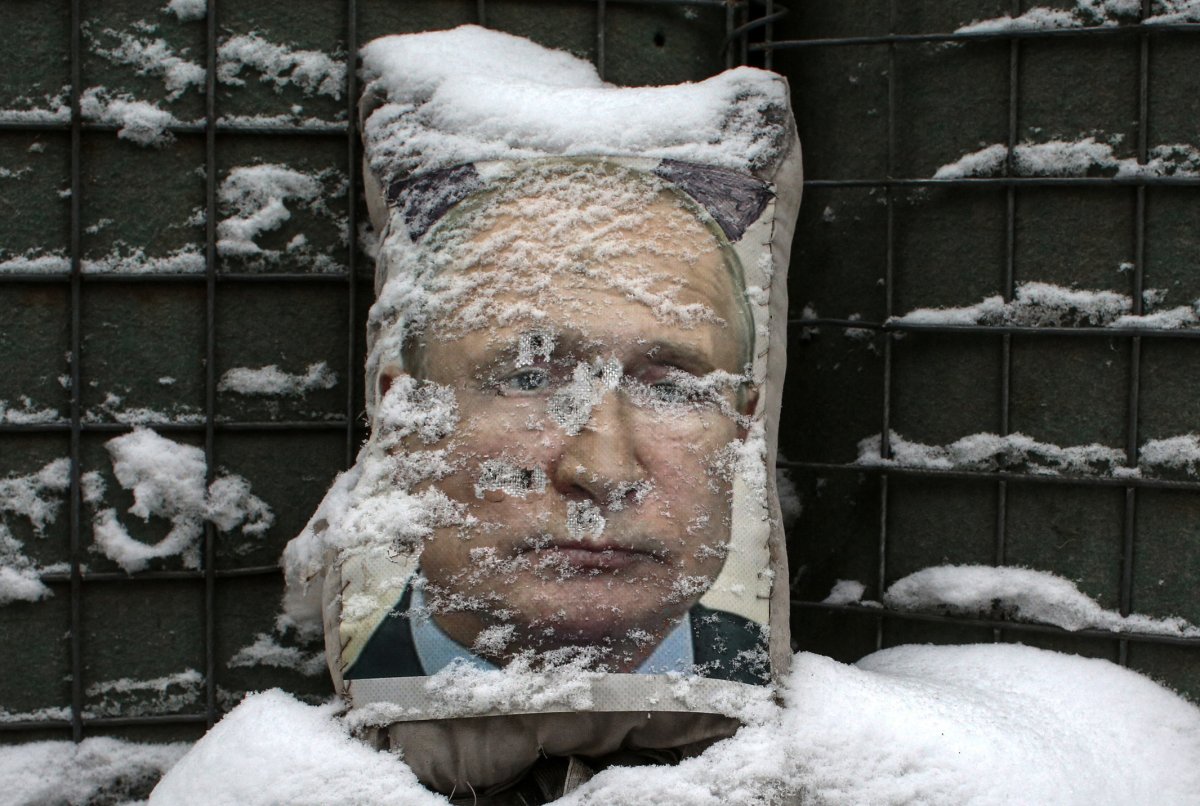Russia will face "severe" consequences if President Vladimir Putin orders another invasion of Ukraine, spokespeople from several NATO states have told Newsweek, as President Joe Biden reportedly mulls deploying fresh American troops along Russia's frontiers in Eastern Europe and the Baltics.
The Baltic states of Latvia, Lithuania and Estonia are at the forefront of European Union and NATO efforts to deter further Russian aggression in Ukraine. All three have repeatedly urged a tougher response to Russian belligerence, the cancellation of Moscow's Nord Stream 2 natural gas pipeline to Germany, and more military support for Ukraine.
They told Newsweek of their concern that the massing of Russian troops—and its planned joint military drills with Belarus scheduled for next month—represent a grave threat to Ukrainian and European security. They also warned that any Russian aggression would prompt massive retaliation.
"We don't know the ultimate purpose of these exercises," a Latvian Foreign Ministry spokesperson said of the planned Russia-Belarus drills, due to begin on February 10.
"We follow them with concern and view them in the broader context of Russian military build-up near the border with Ukraine and the Belarusian regime's hybrid attacks against the EU," they added, referring to Minsk's recent weaponization of migrants and other measures.
"Any additional military exercises and show of force are tactics aimed at extracting concessions," the spokesperson suggested. "Such activities directly contravene the aims and purposes of dialogue, predictability and trust-building. We resolutely dismiss provocations."
"In the case of Russian military aggression against Ukraine there will be massive consequences and severe costs," the ministry warned.
The Lithuanian Foreign Ministry said it considers the joint military exercises "a part of a broader strategy by Russia to increase pressure on Ukraine, U.S. and NATO. In the current already tense security situation in Europe, the deployment of Russian troops to Belarus adds to the escalation and raises our concern."
"Complaints by Russia and Belarus about alleged NATO's build-up are baseless, we strongly reject this unprovoked policy of threats and ultimatums," the Lithuanian spokesperson added.
"We reiterate calls on Russia to de-escalate and engage in a diplomatic process to address all relevant issues. We expect also that the exercise will be duly notified in accordance with the Vienna Document provisions and that Russian troops and equipment will be withdrawn from Belarus after the exercise."
Economic and Political Consequences
The Estonian Foreign Ministry warned: "Any military action against the territory of Ukraine will lead to severe economic and political consequences to Russia."
The Belarus exercises, the Estonian spokesperson told Newsweek, "are a further escalation of the security situation in the region. In scope and timing, they fall outside the regular exercise program we have seen in the past years."
"Although there is no imminent threat to NATO borders, the Russian troop and weaponry deployments in Belarus are taking place in the context of a wider military build-up on the borders with Ukraine," the spokesperson added.
"We will continue to monitor the situation closely and call Russia and Belarus for full transparency as well as military de-escalation on the borders with Ukraine, in occupied Crimea and in the Black Sea region."
More than 100,000 Russian troops remain deployed along Ukraine's borders. Kyiv has for months been facing a possible Russian invasion from north, east and south, supported by allied Belarusian forces and separatist militants in Ukraine's war torn eastern Donbas region.
Russia's Concern About NATO
Months of de-escalation efforts have failed to ease tensions. Moscow is demanding legal guarantees that Ukraine won't be allowed to join the NATO alliance, framing Kyiv's long time membership hopes as evidence of a decades-long Western strategy to surround and suffocate Russia. Ukrainian, NATO and U.S. leaders have rejected Moscow's demands.
Russia has amassed enough troops for a significant incursion into Ukrainian territory, though a conventional invasion isn't Putin's only option.
Moscow may also use cyber attacks to cripple key Ukrainian institutions and infrastructure, or act through proxy forces in separatist-controlled Donbas. The U.K. government reportedly fears the Kremlin is plotting a coup by pro-Moscow Ukrainian politicians.
The U.S. and several of its NATO allies—including Latvia, Lithuania and Estonia—are increasing military assistance to Ukraine, hoping a more potent Ukrainian army will deter a Russian invasion.
Troops on the Ground
Biden has refused to deploy American troops to Ukraine. More than 100 members of the Florida National Guard are currently in Ukraine training local soldiers, but Biden said in December that sending any new units "is not on the table...The idea that the United States is going to unilaterally use force to confront Russia invading Ukraine is not on, in the cards right now."
The New York Times reported on Sunday that the White House is considering sending thousands more troops—backed by warships and aircraft—to Eastern Europe to strengthen NATO rapid defense units along Russia's borders, including in Latvia, Lithuania and Estonia.
Meanwhile, the U.S. and U.K. have begun drawing down staffing levels at their embassies in Kyiv, starting with families of embassy staff and non-essential personnel. European Union diplomats won't follow suit, according to foreign policy chief Josep Borrell.

Uncommon Knowledge
Newsweek is committed to challenging conventional wisdom and finding connections in the search for common ground.
Newsweek is committed to challenging conventional wisdom and finding connections in the search for common ground.
About the writer
David Brennan is Newsweek's Diplomatic Correspondent covering world politics and conflicts from London with a focus on NATO, the European ... Read more
To read how Newsweek uses AI as a newsroom tool, Click here.








